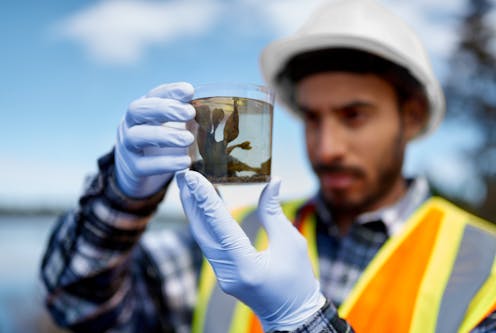The English language dominates global conservation science – which leaves 1 in 3 research papers virtually ignored
- Written by Tatsuya Amano, Australian Research Council Future Fellow, The University of Queensland

English is considered the language of international science. But our new research[1] reveals how important scientific knowledge in other languages is going untapped. This oversight squanders opportunities to help improve the plight of the one million species[2] facing extinction.
We reviewed almost 420,000 peer-reviewed papers on biodiversity conservation, published in 16 languages other than English. Many non-English-language papers provided evidence on the effectiveness of conservation measures, but they are often not disseminated to the wider scientific community.
History shows many valuable scientific breakthroughs were originally published in a language other than English. The structure of a Nobel Prize–winning antimalarial drug was first published[3] in 1977 in simplified Chinese, as were many of the earliest papers[4] on COVID-19.
Evidence-based conservation[5] is crucial for tackling the Earth’s biodiversity crisis. Our research shows more effort is needed to transcend language barriers in science, maximising scientific contributions to conservation and helping save life on this planet.
Conservation game-changer
Most scientists speak English[6] as a first or second language. And many academic reward programs are skewed towards getting published[7] in international English-language journals.
But important evidence in biodiversity conservation is routinely generated by field conservationists and scientists who are less fluent in English. They often prefer publishing work in their first language – which for many, is not English.
More than one-third[8] of scientific documents on biodiversity conservation are published in languages other than English. However, such knowledge is rarely used at the international level.
Take, for example, the Intergovernmental Science-Policy Platform on Biodiversity and Ecosystem Services (IPBES). Analysis of the IPBES biodiversity assessment reports has found 96% of references[9] cited are written in English.
Clearly, tackling any global challenge, including the biodiversity crisis, hinges on tapping into the best available knowledge, whichever language it’s produced in. Our translatE project[10] aims to overcome the language barriers to improve this information flow.
As part of the project, we screened 419,679 peer-reviewed papers published in 16 non-English languages between 1888 and 2020 across a wide range of fields. These spanned biodiversity, ecology, conservation biology, forestry and agricultural science, to name a few.
We found 1,234 papers across the 16 non-English languages that provided evidence on the effectiveness of biodiversity conservation interventions. To put this in perspective, the Conservation Evidence[11] database, which documents global research into the effectiveness of conservation actions, holds 4,412 English-language papers.
The rate of publication of relevant studies is increasing over years in six non-English languages: French, German, Japanese, Portuguese, Russian and simplified Chinese.
Among the non-English-language studies we found were a Spanish study[12] on alleviating conflicts between livestock farmers and endangered Andean mountain cats in northern Patagonia, and a Japanese study[13] on the relocation of endangered Blakiston’s fish owls.
Such findings might have valuable insights for human-nature conflicts and threatened bird management in other parts of the world.
Most English-language evidence on what works in conservation relates to Europe and North America. In some highly biodiverse regions where conservation is needed most, such as Latin America, evidence is desperately lacking[14].
Research in languages other than English is especially common in regions where English-language studies are scarce, such as Latin America, Russia and East Asia (see figure below).
Many non-English studies also involve species for which studies in English are few or non-existent. Incorporating non-English studies would expand scientific knowledge into 12-25% more geographic areas and 5-32% more species.
Read more: Human progress is no excuse to destroy nature. A push to make ‘ecocide’ a global crime must recognise this fundamental truth[15]
Tapping global knowledge
Making the best use of non-English-language science can be a quick, cost-effective way to fill gaps in English-language science.
Our research recommends more effort to synthesise non-English-language studies, and making this knowledge available in English so it can be disseminated to a global audience.
And research projects should seek to involve native speakers of different languages. For our research, we worked with 62 collaborators who, collectively, are native speakers of 17 languages.
To have the best chance of halting Earth’s extinction crisis, we must harness the skills, experience and knowledge of people from around the world.
We also urge wider disciplines to reassess the untapped potential of non-English science to address other global challenges.
Read more: 'The pigs can smell man': how decimation of Borneo's ancient rainforests threatens hunters and the hunted[16]
References
- ^ new research (doi.org)
- ^ one million species (ipbes.net)
- ^ first published (doi.org)
- ^ earliest papers (doi.org)
- ^ Evidence-based conservation (doi.org)
- ^ speak English (www.nature.com)
- ^ getting published (www.researchtrends.com)
- ^ one-third (doi.org)
- ^ 96% of references (doi.org)
- ^ translatE project (translatesciences.com)
- ^ Conservation Evidence (www.conservationevidence.com)
- ^ a Spanish study (mn.sarem.org.ar)
- ^ Japanese study (doi.org)
- ^ desperately lacking (doi.org)
- ^ Human progress is no excuse to destroy nature. A push to make ‘ecocide’ a global crime must recognise this fundamental truth (theconversation.com)
- ^ 'The pigs can smell man': how decimation of Borneo's ancient rainforests threatens hunters and the hunted (theconversation.com)

















